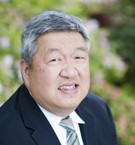Recently, a friend contacted me and asked for a resource in pre-marital counseling that would be specific to some of the unique cultural needs of an Asian-American couple. I thought about this for a while and realized that I was not familiar with such a curriculum. I explained to him that I typically use material by Family Life’s Dennis and Barbara Rainey and add my own insights on some of the challenges for Asian-Americans in preparing to get married. This first blog will summarize some of those insights.
Simply put, the biggest difference in counseling an Asian-American couple in pre-marital counseling boils down to issues related to family relationships, especially in regards to parents and in-laws. This will be examined in light of some well-known passages that address this topic. Typically, this begins with the passage in Genesis 2:24 which states, “For this reason a man shall leave his father and his mother, and be joined to his wife; and they shall become one flesh.” This idea has been termed by Christians as the concept of “leaving and cleaving.” In other words, the newly married couple leaves the comforts, financial support, and authority of his/her respective parents and then cleaves to one another as they start a brand new family entity. This allows for growth, maturity, responsibility, independence, and a future lineage to begin.
In light of this biblical idea, there is a difference of interpretation between Western and Eastern interpreters, not necessarily on the concept itself, but more on the duration of this principle. Specifically, the “cleaving” part is not a problem for most Asian-American parents of the newly married couple. It is the “leaving” part that is debated and in some cases even rejected. When can “children” leave the authority of their parents? How should they continue to honor them? What obligations do they need to practice continually? Here are some of the possible challenges to this discussion along with a few biblical passages that are interpreted differently.
This discussion begins with a familiar passage from Ephesians 6:1 which states, “Children, obey your parents in the Lord, for this is right.” The debate focuses on the meaning of the word “children.” Most likely, Westerners, who are time oriented, would emphasize the age of the child in question. So this person would cease to be a child, for example, at the age of 18, when he becomes more independent, being able to sustain his own income and take care of his own bills and financial responsibilities. An Eastern mindset, which places much more emphasis on status, rank, and relationship would see a child as a child from a parent’s perspective potentially as long as the parent and child are alive. In other words, no matter how old the son or daughter is, the Asian parent will see them as their child even with the change in marital status.
This perspective thus includes the expectation of complete obedience and even life-long care from their children. The reason is that most Asian-American cultures are extremely hierarchical in nature largely due to Confucian influences that emphasizes filial piety. Filial piety and Confucianism emphasize five different relationships, one of them being between parents and children.
As a result of this differing perspective on “children” coupled with the influence of Confucian filial piety, the duration of loyalty towards Asian parents is extended. This adds to the difficulty to “leave” parents in the traditional Western manner that is often understood. So although the “children” may be able to physically “leave” the home, they are still culturally bound by their parent’s authority. In addition, yet another passage is also used to preserve this idea of life-long care and provision. The passage is 1 Timothy 5:8 that says “But if anyone does not provide for his own, and especially for those of his household, he had denied the faith and is worse than an unbeliever.” While the specific context of this passage seems to apply mainly to widows, the passage is often used in a way that would include both parents until their passing.
Culturally and practically, this plays out in the following ways: Traditionally, it was the responsibility of the oldest child, typically male, to take care of the parents in their older age. The way that this was shown practically was that they would take them into their homes and watch over them in the same way that their parents took care of them when they were younger. As a result, a rest home or convalescent hospital would have been out of the question. The duration of the reciprocated relationship basically extended over a lifetime. This trend has been changing though over the last few decades as more and more Asian-Americans are following more Westernized practices of having their parents put into such institutions.
I do personally believe that there are merits to both the Western and Eastern perspective here. Obviously, caring for aging parents is a great virtue and would be a part of honoring them (Eph. 6:2). On the other hand, it would be important for the newly married couple to be able to grow and establish themselves well for not only their future but also for their children and the following generations. And I would simply stress the point that these differences need to be brought out and discussed in the pre-marital counseling time so that there would be no surprises in the future for the marrying couple. My goal in this blog is not to make a judgment of what is right or wrong in these concepts, but rather to show the difference of perspectives in practice. In my next blog, I will give some suggestions on how Asian-American couples can honor their parents in a biblical manner that is also culturally appropriate.
This is an article in a four-part series. Click here for part two of the series.
 Biola University
Biola University
.jpg)


.jpg)